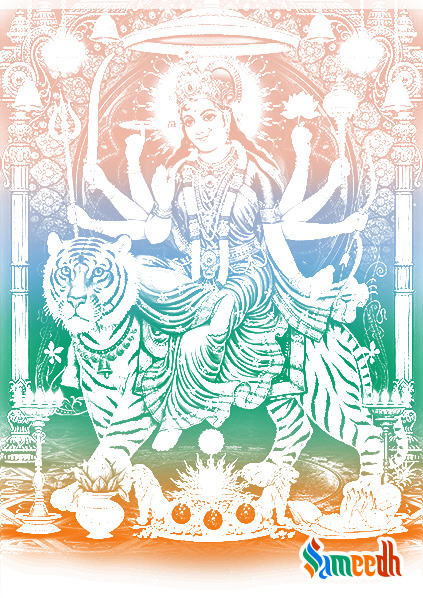The powerful Hindu warrior goddess of strength and courage, birthed to kill Mahisasur, a buffalo demon.
Durga is a widely worshipped goddess in Hinduism for her massive strength, power, ferocity and courage. She is associated with motherhood, protection, destruction and war as well. The name means various things such as invincible and unattainable. She is famously called Mahishasur Vardhini, the one who killed the buffalo demon, Mahishasur. Durga is the warrior goddess of Hinduism which took this form to put an end to evil forces symbolically and literally.
Origins
Durga was formed to defeat the buffalo demon Mahishasur. This demon rose to its massive strength when he asked Brahma for a boon after pleasing him with his spirituality. Mahishasur had firstly wished to be immortal but Brahma refused complying to this request. As the demon considered women weak, he cunningly asked to be killed only by a woman, which he thought would in turn make him invincible as he had wanted earlier. While granting the boon, little did Brahma know about the havoc Mahishasur was going to cause. The animalistic form of the devil tortured and harassed people mercilessly. His fear-mongering concerned the gods, devas, and they all headed to the Trimurti of Brahma, Vishnu and Shiva, for help. All these gods’ attempts went in vain. Vishnu, Shiva, Indra – King of gods, Kumar – Chief of celestial armies, Narsimha – the lion man, all fought against Mahishasur only to lose the battle.
Amidst such turmoil, emerged the Devis, the female forms of the gods. These Shaktis, forms of energy, were Vaishnavi, Brahmi, Shivani, Indrani, Kumari, Narsimhi and Varahi, the female equivalent forces of the gods. They all came together to create a woman with all their energies combined, giving birth to Durga, a woman whose purpose was destruction and killing. As a result, Durga was truly invincible as her powers were the combined strengths of the mightiest deities.
The gods each gave her a weapon similar to theirs to perish the demon. Brahma gave his bow, Vishnu his circular disc or chakra, Shiva handed his trident, Indra and Kumar granted their thunderbolt and lance respectively. Moreover, Himavat, the embodiment of the great Himalayas, blessed Durga with a lion as her ride. The lion is known as the king of the jungle and signifies immense power, pride and strength. The goddess was skilled with battle tactics, filled with knowledge, vigour, rage, and determination and would stop at nothing till she attained the goal of her existence.
Mahishasur Vardhini
Mounting on top of her vahan, the ride of a lion, holding all the gifted weapons along with a chain of rosary beads firmly with her multiple hands, adorned with jewels and garland of flowers, Durga was prepared for battle. Her bright red saree, an Indian garment, portrayed the rage, power, energy and danger she personified. She too possessed the third eye like Shiva, enabling her to perceive what lies beyond the physical realms.
She went riding to Mahishasur, killing all his soldiers on the way. When the two opposing forces directly faced each other, the Universe was shaken at the clash of such enormous energies. Although Durga was indeed an equal match for the demon, he stood unbeaten even after being attacked with all the weapons. He was finally killed when Durga decided to dismount from her ride and with her sheer physical force stepped on Mahishasur, crushing him and then penetrating the holy trident through his chest.
Durga achieved her fate of destroying one of the strongest demons and evil forces of the Universe fearlessly. Durga Puja is celebrated in her honour, victory over Mahishasur and the triumph of good over evil.
